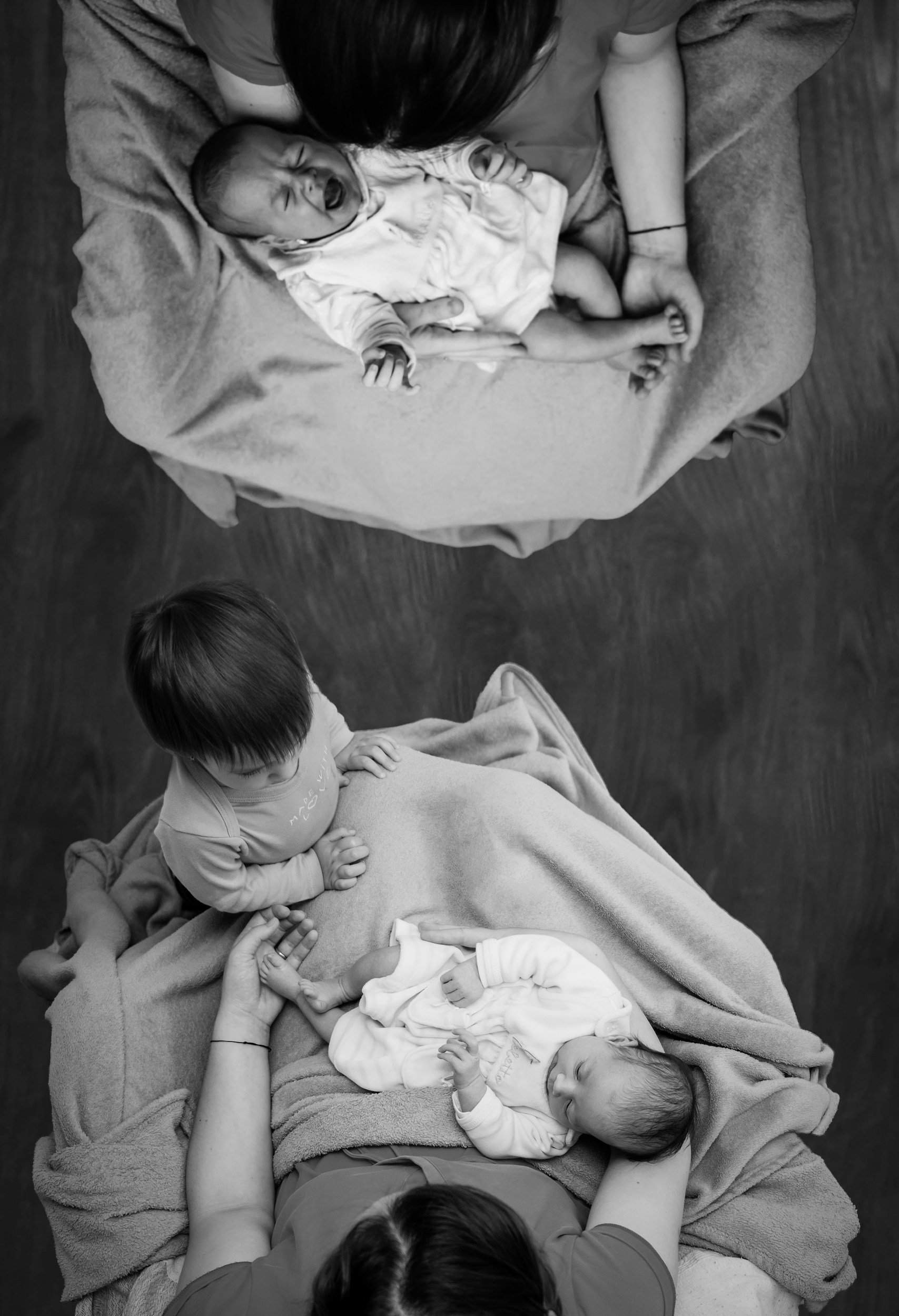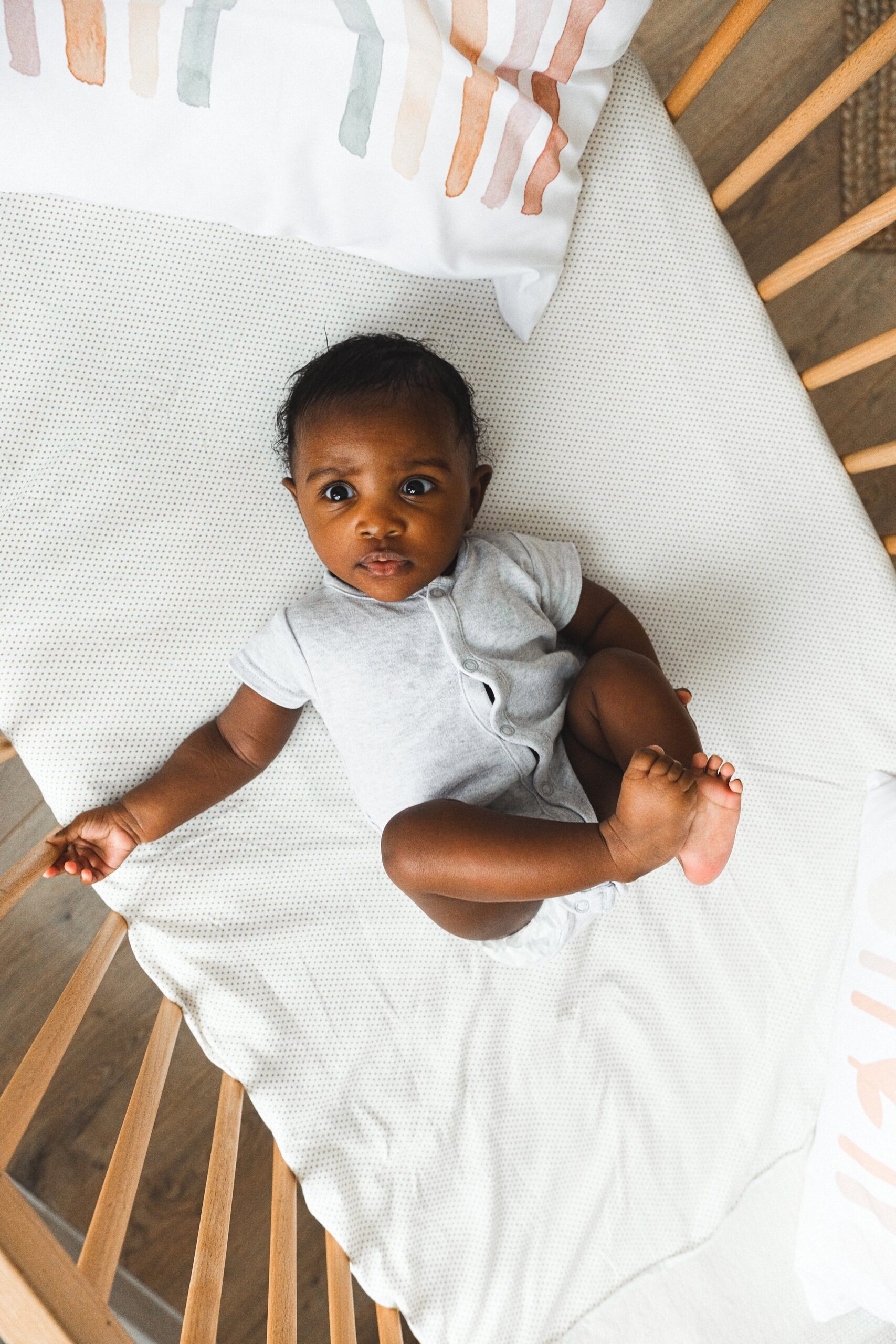I'm Rachael
Mom of 3 & Baby Sleep Expert with Big Sis Energy
& I’VE DONE ALL THE RESEARCH FOR YOU ALREADY.
Better sleep for the entire family
BROWSE COURSES
hey!
Why is my Baby Fighting Sleep?
in this post:
Have you noticed your baby “fighting” sleep? Suddenly naps are a battle, or the fussiness seems to have no end. Nap time and/or bedtime take forever and are full of tears. This is a really, really common experience, but of course, that doesn’t make it any less frustrating (or draining!) for everyone involved. In my experience this often happens for younger babies, especially between about 4-10 months old. There is SO much huge development happening, plus spikes in separation anxiety around 6 and 9 months. If you can’t pinpoint a reason for the fussiness, you might try just riding the wave and letting the phase pass. The big thing to always rule out first is pain, discomfort, or feeding issues.
When baby fights sleep, it can look all sorts of ways. Most commonly it’s exactly what it sounds like- a fight. There might be screaming, crying, squirming out of your arms or fighting at the breast or bottle, and maybe even some tears out of you! Naps and bedtimes don’t have to be this way. The first step towards solving “fighting sleep” is figuring out what exactly is going on. It’s not always easy to tell, especially since there are a number of common reasons that babies might resist sleep — let’s go ahead and dive in!
What does “fighting sleep” even mean?
For starters, the term “fighting sleep” is a bit misleading — babies don’t really FIGHT sleep. After all, sleep comes naturally to humans when we are ready for it and when our system isn’t overloaded with stress. The same is true for babies.
When babies seem to be “fighting” that instinct to sleep, it’s almost always a sign of something else happening to them. Whatever’s going on is causing them to feel like it’s not safe to fall asleep. It’s up to us to get curious about what’s behind that crying. It may take a few tries to figure out what your baby is trying to tell you — that’s totally normal!
You might start with getting curious about the situations/ timings in which your baby fights sleep. Will they happily drift off in your arms or on the go, but “fight” when you try and bring them to the nursery or transfer them to the crib? Do they only “fight” sleep at bedtime after a long, stimulating day? Taking note of these patterns can help you decipher just what your baby is actually fighting.
signs my baby might be fighting sleep
Just like there’s no one magic sleep solution that works for every baby, there’s no singular sign of “fighting” sleep. It really can vary from baby to baby. Typically what’s described to me (and what I’ve experienced myself- mom of 3 here!) is a VERY upset and fussy, or even inconsolable baby. There might be lots of crying or screaming, arching their back, going stiff, pushing off of you, scratching, etc. Baby might *almost* fall asleep and then jerk back awake and become very upset all over again.
You might also notice their schedule shifting – the last nap of the day is becoming harder and harder, or being skipped entirely, or the morning nap might be happening later, etc. For babies with an easy-going temperament, “fighting sleep” won’t necessarily look as dramatic, but you’ll notice them having a harder time going to sleep or taking a very long time to settle down.
Five Reasons Why Your Baby Might Be Fighting Sleep
Reason #1: Separation Anxiety
Babies naturally want to be near us All! The! Time! If your baby is sleeping in a crib, or another space that’s not with you, they may be fighting separation, not sleep. When they can sense that any separation is about to happen (like going to sleep in a crib), they become very vulnerable, and their state of alarm is activated, which makes it really tough for them to fall asleep.
The more baby is separated from us during the day (like when they’re at daycare!) the more frantically they might seek a connection when you’re together. Especially for parents who are working full time, we’re only seeing our baby for a couple of hours in the evening. The rush of dinner, bedtime, and all the household chores can make it challenging to really connect with your baby. They can sense this, and go into full alarm when we try to separate at bedtime.
Reason #2: Overtired / Under-tired Baby
It sounds counterintuitive, but an “overtired” baby is not going to be able to fall asleep (and stay asleep!) as easily as a baby that hasn’t been experiencing sleep “debt”. The more overtired a baby is, the more their sleep latency (time it takes to fall asleep) shortens between sleep cycles, disrupting those cycle transitions and resulting in less NREM sleep. However, try not to get TOO bogged down in thinking your baby is overtired. Very rarely does a baby experience true sleep deprivation or truly chronic overtiredness. It’s often a scapegoat for any old sleep issue or fussy behavior. On the flip side, fussiness can also be a sign that your baby is simply understimulated (aka bored!), undertired, and just not ready to go to sleep yet. I know, it’s tricky, right?
This happens with my own baby all the time — sometimes I know I’ll be out during her wake window, so I really try to put her down early… only for her to resist the nap. Your baby could similarly be under-tired and truly not ready for sleep yet, or extremely overtired and fussy, or getting a “second wind.” If this is a once-in-while scheduling hiccup, this is not a big deal at all! Try and track wake windows for a few days to see if you notice a pattern- is the fight happening less with a longer wake window or later nap? That might be the ticket!
Reason #3: Environmental Disruptions
Take inventory of your baby’s sleep situation, and what they might be reacting to. Is something in the room too stimulating, bright, or noisy? What about what they’re wearing: could something be too itchy, hot, or cold, etc.? Something as simple as blackout curtains (use code heysleepybaby for 10% off) or a white noise machine could be a major help to reduce stimulation and soothe your baby to sleep.
Reason #4: Comfort
Sometimes that fussiness is pointing to how your baby physically feeling: they may be gassy, sick, teething, or in pain. Sometimes your baby just has to poop! These scenarios just sort of happen and are really normal — definitely not anything to get super stressed over. Especially if it’s only happening once in a while — think a couple times a week — it doesn’t necessarily point to anything major going on, with one BIG caveat: If your baby is nursing to sleep and is fighting you at the breast, PLEASE check things out with a lactation consultant. It could make all the difference!
Reason #5: Parental stress
This is actually huge! If we are stressed or anxious about bedtime or naps, your baby will 100% pick up on this. Babies are really good at tuning into our emotions – they rely on this for coregulation of their own emotional state. So if we are stressed, baby is stressed. Even more concerning, it can create a pattern, teaching them that sleep is not a safe or comfortable place to be. This can become a really tough pattern to break, so do your best to brainstorm some coping techniques to pull out when you’re feeling stressed or angry about your baby not going to sleep, and consider taking a break from crib/ nursery naps for a while to break the negative association.
How to Stop Your Baby from Fighting Sleep
When baby is habitually really fighting going to sleep, that’s when we need to get curious about what is going on, thinking about the potential causes I laid out above. There are a few approaches you can take, depending on your baby’s situation!
If your baby is fighting sleep because of over/under tiredness, try this:
If you’re finding that your baby is over or under tired, it’s possible that your baby’s sleepy cues are changing or being missed. Are they truly tired or maybe just under stimulated? Could they use a change of scenery, or some time outside? A new game or toy? A snack? Fussiness and spacing out are sometimes a sleepy cue, but they could also point to boredom.
If you think your baby is sleepy, but it’s taking them forever to get them to go down, it’s likely that they weren’t’ quite tired enough yet. It’s okay to pause, go take a break, and try again in 15-20 minutes. Play with extending wake windows a bit to see if that makes a change, or try to get the energy out! Lots of babies need some time to exert energy before a nap or bedtime. Rough and tumble play is a great way to do this.
Conversely, your little one could be overtired and need a bit of shorter wake window. More sensitive or low activity babes might need extra time to wind down and transition to sleepy time. They may need extra time in a dim room, a long nursing session, etc. Remember the shortest window of the day is typically the first one (between wakeup and first nap) and some babies also benefit from a shorter window before bed. (Of course, not all babies though!)
Try to get curious and play with these things. Try it one way for a couple of days and if it’s not working, try it the other way. Check out my blog post on overtiredness for even more tips and ideas.
If your baby is fighting sleep because of separation anxiety, try this:
In many cases, our babies are fighting the perceived separation that sleep brings. You might notice them completely flip out when you enter the nursery, or they sleep great for contact naps, but you can’t put them down. In this case, you can try playing in the sleep space during wake time so they don’t only associate it with sleep / separation – like changing their diaper on the couch or nursing on your own bed.
Another strategy is “love bombing” your baby with kisses, cuddles, stories, eye contact, singing, massage, etc. BEFORE and DURING the nap or bedtime routine. Consider adding some rough and tumble type of play, or snuggling before bedtime, so your baby gets lots of physical contact from you. And when you actually hit that bedtime routine, s l o w d o w n. It doesn’t have to take forever, but be conscious of whether you’re rushing through it. Babies can pick up on that energy and will resist it even more.
If your baby is fighting sleep because of parental stress, try this:
Babies and toddlers are like mirror. They pick up on our every emotion. If you are emitting stress and anxiety or even anger or frustration during nap or bedtime, this will transfer to your baby. They will not only feel your stress, which makes falling asleep harder, but they will learn that YOU don’t feel comfortable about sleep, and will therefore learn that it’s not a relaxing, enjoyable, or safe experience. If you’re struggling with coping strategies, talking to a therapist is always a great idea.
@rachaelshepardohta Replying to @m A few things to think about! #bedtimeroutine #parentlife #bedtimebattles #fightingsleep #bedtimetips #bedtimetakesforever #toddlerwontsleep #2yearregression ♬ original sound – Rachael | Heysleepybaby
Be sure to check out my Ultimate Crib & Floor Bed Sleep Guide or Tender Transitions Course for making gentle nudges toward independent sleep!
For older toddlers who are fighting sleep or going through things like bedtime stalling, check out the Better Bedtimes Guide.
Featured
Responsive sleep tips and support for parents of multiples or twins.
What are floor beds? When to use them? And How to use them?
Before you start changing anything it’s important that you have ruled out any underlying reasons why your infant might have such a strong link to staying latched.
binge reads
We think you'll love these
You deserve to the
baby stage, not just "survive it."
And you DON'T have to sacrifice your values, ignore your instincts, or force yourself to follow a method you don't align with just to get your baby back to sleep.
I’m here to help you create a restful, sustainable sleep environment that honors both your baby’s needs AND your own (without the stress OR the guilt!) because, no, you don’t have to choose between the two.
enjoy!
BABY SLEEP COURSES →
BABY SLEEP CONSULTS →
Wish you could help your baby sleep better without resorting to sleep training? Download my FREE guide to a good night’s sleep and learn 8 simple, science-backed tips for supporting your child’s needs.
Traditional sleep training methods don’t have to be your solution to better sleep.
SLEEP TRAINING ISN’T THE ONLY WAY TO GET GOOD SLEEP
Hey, I'm Rachael and Hey, Sleepy Baby is for parents who want to get their nights back, without sleep training their babies.
NO ONE TOLD US POD
explorING the untold truths of parenting





